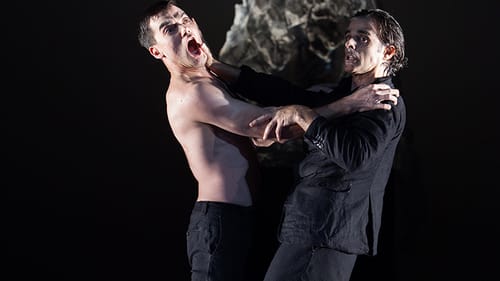Stay in the Loop
BSR publishes on a weekly schedule, with an email newsletter every Wednesday and Thursday morning. There’s no paywall, and subscribing is always free.
From Greece with agony
Attis Theatre's 'Antigone' at the Wilma (second review)

This production of Sophocles’s classic play Antigone was hard to take. The 11-member ensemble, which includes actors from the Wilma and the Attis Theatre of Delphi, moves the action along smoothly. One compelling scene seamlessly follows another to hypnotic effect, but the accumulation of rough and violent action takes a toll, even though it takes place offstage. I was left feeling stressed out rather than experiencing catharsis and relief.
The aesthetic of director Theodoros Terzopoulos is extreme and abstract and raw, with acting that comes across with an unusual power and presence. In a genre whose players are types more than rounded characters, the result can seem to be inhuman. What we get is a festival of raw emotion and stark images buffeting one another, evoking suffering and pain and loss. But somehow the overall effect alienated me rather than evoking my sympathy.
We meet the chorus of Theban elders in the opening scene, in which their goings-on set the mood. The leader (Paolo Musio) stands under a sword blade and speaks in super-rapid Greek that sounds like gibberish, in a neurotic frenzy. The several men of the chorus declare “There are many wonders in the world but none so terrible as man,” whereupon they laugh demonically and then segue into grievous human crying. We realize that they have been traumatized by a long and terrible ordeal, the civil war of Thebes.
They raise a long banner of photographs of 20 faces, all people of color, casualties of the war. In shock the men of the chorus gape with open mouths, their bodies shaking and steaming with stuck, unexpressed suffering. Their faces are like masks, contorted in pain from terror and horror and grief.
Like something from The Scream
None look more distraught than the new king, Creon (Antonis Miriagos), who looks as if he just stepped out of The Scream. Miriagos portrays Creon as small in stature, petty and insecure, mad in both senses of the word, not quite up to the job. I couldn’t take my eyes off this troubled, worrisome stick figure of a man. He calls for Antigone’s punishment as a defense against anarchy and feels that as a man he must prevail against a woman. His tortured expression never changes.
Jennifer Kidwell as Antigone projects a bold, self-confident, rash young woman who pledges love for her brother and brassily proclaims her fidelity to the higher unwritten law of the gods about proper burial for the dead. She says she will be happy to join her brother. Kidwell is good in the role, but sometimes her lines seem merely petulant, loud, and angry without having much range of emotion or personal accent. Again, like all of the persons in this pre-Shakespearean drama, she is more of a type than a rounded character, except that as a feminist conscientious objector she is something of a new type.

Kidwell’s highpoint may be her singing of “Summertime,” the Gershwin-Heyward aria that she suddenly begins singing to comfort herself during her lament-descent to her downward fate. It is a pleasant surprise — it sounds just perfect, not anachronistic at all, transcendent, with a right to be there.
One death after another
The swift-moving, harrowing plot continues as one death precipitates another on a gripping and intense ride to a stark conclusion. Ismene (Sarah Gliko) mourns Antigone’s departure by wailing energetically and intensely, as women do on television in foreign countries. Haemon (Brian Ratcliffe) movingly, strongly, but tactfully informs his father, Kreon, that the city supports Antigone, warning him that he is being headstrong, only to be blown off as a weak insolent boy — a very human moment. Eurydice (Sarah Gliko) mourns her son’s death in a few heart-wrenching cries and then kills herself, in a scene that is both affecting and formulaic. The contest between the blind prophet Teiresias and Creon is also powerful but it seems beyond the human.
The emotional scale is outsized and overwrought, but that’s the nature of war and tragedy and the Greeks didn’t sugarcoat it. Sophocles’s place in Western Civ is secure after all these years, but he can also seem to be the Other, not quite human, as he is in this production.
For Robert Zaller’s review, click here.
What, When, Where
Antigone by Sophocles. Translated by Marianne McDonald; Theodoros Terzopoulos directed. Through November 8, 2015 at the Wilma Theater, Broad and Spruce Streets, Philadelphia. 215-546-7824 or wilmatheater.org.
Sign up for our newsletter
All of the week's new articles, all in one place. Sign up for the free weekly BSR newsletters, and don't miss a conversation.
